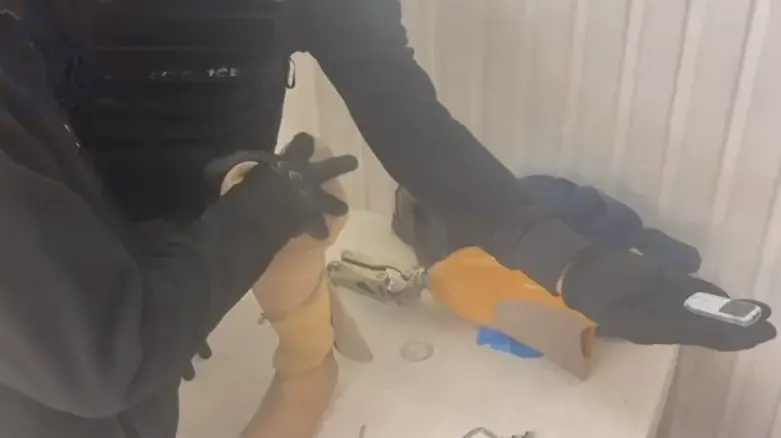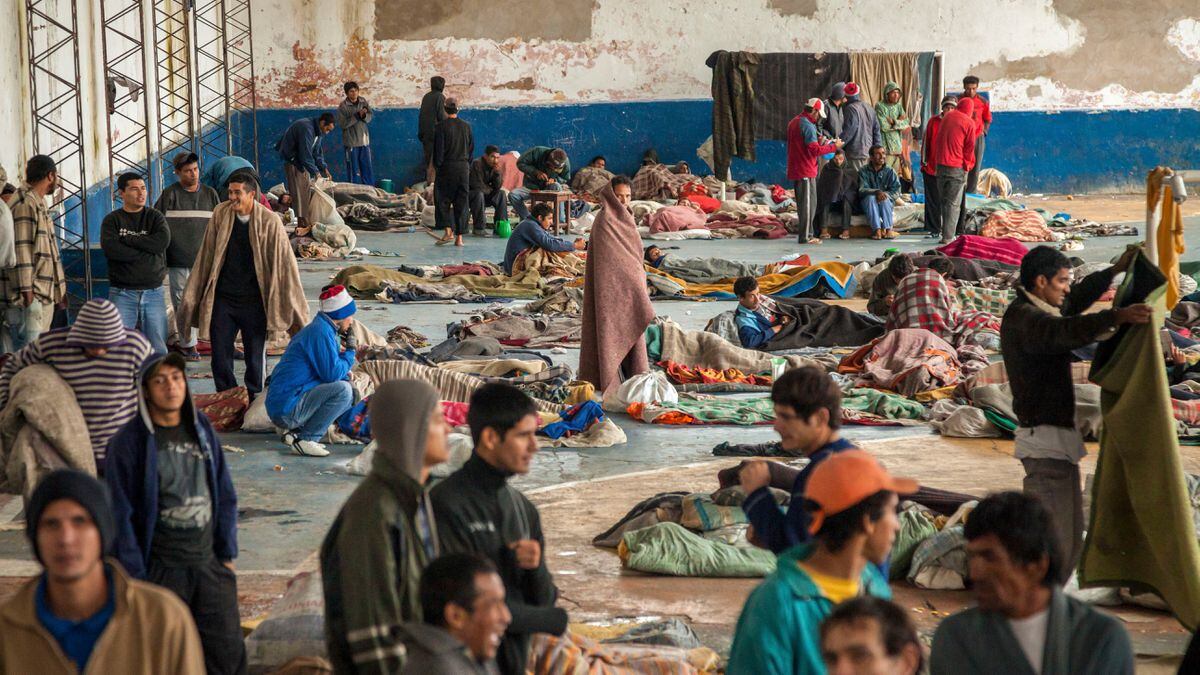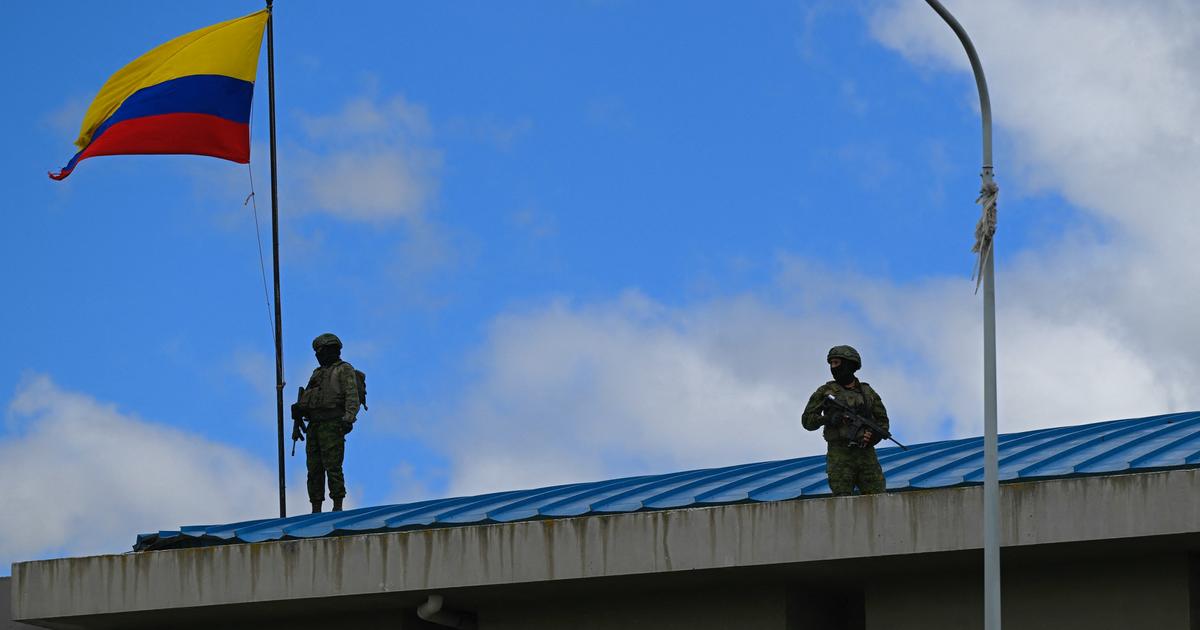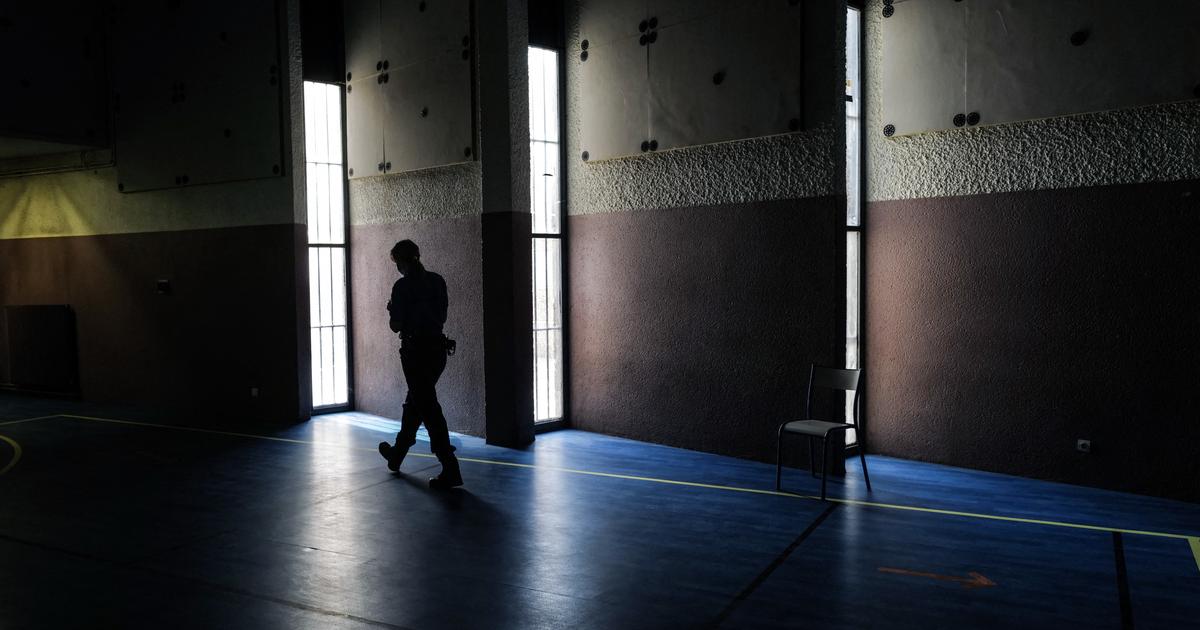A prisoner reads a newspaper of the Universal Church in his cell in the Apac de Paço do Lumiar, one of the 50 prisons in Brazil without guards or weapons where more than 4,000 inmates are serving time.Márcio Vasconcelos
The man who keeps the keys wears a T-shirt and long pants despite the sultry heat of northern Brazil.
He has a mask and a sentence of 30 years in prison for murder.
With a formal gesture, he opens and closes the iron gates to the persons authorized to visit the closed regime wing of this small prison, located in Paço do Lumiar (Maranhão).
When you close the first, you open the second.
After the visitors have left, he will stay inside, and in a few days another inmate like him will be the guard on duty.
He is in a different prison, without weapons or police, but official, where prisoners convicted of even murder, rape or pedophilia are serving their sentences.
Elenilson Bruno, 27, had been in Pedrinhas, the most inhumane prison in the State of Maranhão, for years when he heard about this center.
“A cellmate told me that there was a good place to serve the sentence, where there was no one armed.
The truth is, I didn't believe it, ”the young man, who is serving a 24-year sentence for murder, recently recalled as he guided visitors between the barred cells and the open courtyard.
As soon as he gathered more information, he hired a lawyer and applied.
“The judge asked me if I was really willing to get out of the crime, and if I was sorry.
I said yes and God blessed the decision.
In this environment, where faith carries enormous weight, words are not enough: actions are required.
The wait lasted three years until in 2019 he arrived at this center managed by the Association for Help and Assistance to the Condemned (Apac) and paid for by the taxpayer.
There are 61 inmates supervised by 19 employees.
But it is not an experiment: it is a consolidated and expanding project that applies to 4,300 prisoners (0.5% of the total) in 57 Brazilian prisons.
A handful, female.
His maxim is "kill the criminal, save the man."
Behind bars, more than 50,000 criminals have settled their accounts with the justice in recent decades.
A system closer to the avant-garde reinsertion programs that Brazil applied a century ago than to the current abandonment of a large part of prisons.
Elenilson — a bermuda, flip-flops, a T-shirt in the colors of the Flamengo of his loves and a slight rubberized toupee — proudly says that he is the most responsible among the inmates for the day-to-day management of this wing, which houses those incarcerated for more serious crimes.
Among these men who greet with kindness behind the mask, one is sentenced to 113 years, another to 57 years, another to 54 years ... Carlos Magno, the official in charge of security and discipline, will later detail.
“They have rescued us from the world of crime,” Elenilson says solemnly as he walks among the prisoners, unlike what happens in other prisons, crowded, controlled by organized crime and frequent scene of riots and massacres.
Only the USA and China have more incarcerated than Brazil, where even prosecutors and deputies openly admit that their prison system is a school for criminals.
The differences with other prisons are innumerable: here they eat with cutlery, they work with saws and other tools, each one has his bunk with a fan, the cells are spotless, it is mandatory to wear short nails.
But the inmates - called
recuperandos
- are busy almost every minute of the day with identical hours throughout the Apac system.
At six, upstairs, shower.
At seven, prayer.
Seven thirty, breakfast ... work, study, cook, sweep ... At ten at night, to bed.
And silence.
After years of idle days in other prisons, arriving here can come as a
shock
to those convicted.
The new ones spend 90 days in a workshop working with their hands, building models to clear their heads and focus.
They handle tools that are potential weapons.
Absolutely everything is regulated.
Watching TV requires filling out a form with all the details of the desired program or game.
Washing clothes and utensils absorbs pleasure time.
They have evangelical worship, Catholic mass and song.
Three days a week they can make a six minute phone call.
There is also an opportunity for a vis a vis with your partners or a moon bath in the patio, which is a stall and a soccer field.
They have a quarantine cell for pandemic newcomers.
Discipline and trust are the pillars of the method devised in the 1970s by a late Catholic lawyer and journalist, Mario Ottoboni.
At first he was motivated by the desire to evangelize the inmates.
Then he devised a methodology that combines family commitment, legal aid and health.
Apac has exported its recipe to countries such as Chile, South Korea, Hungary or Norway.
Anthropologist Karina Biondi has studied the prison population since her husband was imprisoned and acquitted.
Before the pandemic, he ran an academic program with his students from Maranhão State University in this prison on the outskirts of the capital, São Luís.
He states that “it is a method recommended by the Ministry of Justice because it is seen as very effective.
It is cheaper and the rate of recidivism is lower ”.
The savings are largely due to the absence of armed guards.
Each one of these inmates costs about 1,000 reais per month (160 euros), half that in the ordinary regime.
And recidivism plummets to 15% compared to the Brazilian (80%) and international (70%) average, according to Apac.
Daily discipline is as demanding as the queue to enter.
This center has 135 inmates on the waiting list.
The anthropologist explains that “the selection is very rigid.
Not every inmate is fit.
It is a very strict regime reminiscent of Alcoholics Anonymous ... one day away from crime, ”he says.
Despite the fact that, next to a common prison, this center may seem like a paradise, the commitment it requires from inmates and their families is such that those sentenced to longer sentences are usually those who are willing to invest the necessary will to access them.
From time to time, a convict asks to return to a prison where he will only have a hammock and infamous food, but without this frenzied activity.
None of these prisons have had a riot.
And leaks are rare, but there are.
The center visited by this newspaper at the end of January has been startled by two escapes;
one in October, another on Carnival Saturday.
Maranhão, the second state with the highest number of prisons of this type, maintains its bet despite the double escape, as Governor Flávio Dino explained to EL PAÍS.
“They are isolated cases and restricted to a center.
With 99% of the inmates there is no problem.
The other Apacs are quiet and do not present complications of this type.
We continue to believe in the model.
So much so that we will open a female Apac with 40 seats and we will build two new ones with 164 seats each ”.
Dino, who was a judge, maintains that "the execution of the sentence must be individualized", without mixing a thief with a member of a criminal organization.
The president, who is proud of the paid work and education programs for prisoners, recalls that he has just inaugurated a maximum security prison.
Sergio, a 46-year-old rancher sentenced to 15 years in prison for drug trafficking, says he has two years left to get out, although his sentence will not be over by then.
"I came because I thought this was a better place to prepare to return to society," he says in Spanish learned with his wife, a Bolivian.
Thanks to being in a semi-open regime, it manufactures paving stones and charges for it.
The leaks at Paço do Lumiar have been a devastating blow.
Ayolanda da Silva, administrative manager of the center, says that
recovering
and employees are psychologically destroyed after the second escape.
Confidence flew through the air.
For Elenilson and his colleagues, this means losing activities that they had been gaining with commitment and responsibility.
Awards and punishments in order to prepare them for the moment of truth: the day when another prisoner will open the two iron gates for them, never to return.









